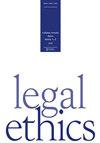Public professions and private practices: access to the solicitors’ profession in the twenty-first century
IF 0.3
Q1 LAW
引用次数: 2
Abstract
ABSTRACT Recruitment of trainee solicitors by largely commercial organisations provides the effective gateway to professional qualification for aspiring solicitors. Professional bodies and others have sought to distinguish solicitors from other legal service providers through reference to professionalism and ethics. In this article I present the findings from a survey of the applicant experience of the graduate recruitment process and interviews with the professionals involved in those processes. The research is situated within the literature on professional identity development. The main aims are to contribute to understanding of the way in which graduate recruitment may inform the construction of professional identities, with particular focus on notions of ethicality within that. These engagements come at a critical time for professional identity construction. Despite data suggesting applicant expectations that professionalism and ethics will be important in their future practice, these early encounters do little to support that view. The influence of selection activities most likely marks the beginning of longer-term experiences that diminish the significance of ethicality in notions of professionalism. The data identifies recruiter assumptions as to appropriate ethical character. There is also evidence that the recruitment process may actively undermine ideas such as independence as relevant to legal practitioners.公共职业与私人执业:进入二十一世纪律师行业的途径
主要由商业机构招聘见习律师,为有抱负的律师获得专业资格提供了有效途径。专业团体和其他机构试图通过专业精神和道德规范将律师与其他法律服务提供者区分开来。在这篇文章中,我介绍了一项关于毕业生招聘过程中申请人经历的调查结果,以及对参与这些过程的专业人士的采访。该研究位于职业认同发展的文献中。主要目的是帮助理解毕业生招聘如何为职业身份的构建提供信息,并特别关注其中的道德观念。这些合作正值职业身份建设的关键时期。尽管数据表明申请人期望专业精神和道德规范在他们未来的实践中很重要,但这些早期的接触并不能支持这种观点。选择活动的影响很可能标志着长期经历的开始,这种经历削弱了职业道德观念的重要性。这些数据确定了招聘人员对适当道德品质的假设。还有证据表明,招聘过程可能会积极破坏与法律从业人员相关的独立性等观念。
本文章由计算机程序翻译,如有差异,请以英文原文为准。
求助全文
约1分钟内获得全文
求助全文

 求助内容:
求助内容: 应助结果提醒方式:
应助结果提醒方式:


